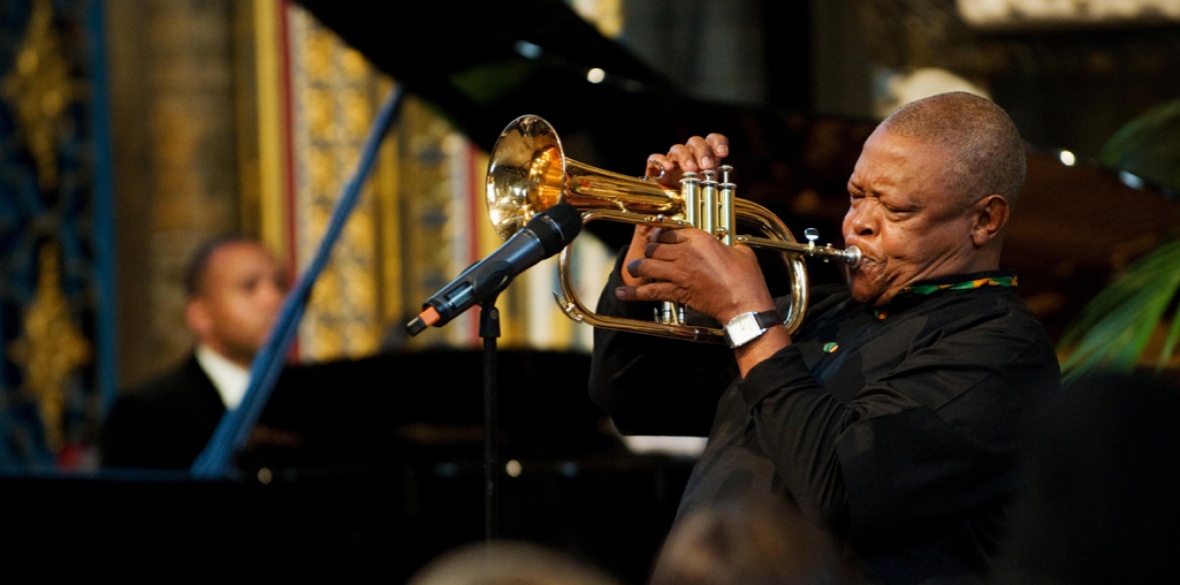This is the last article you can read this month
You can read more article this month
You can read more articles this month
Sorry your limit is up for this month
Reset on:
Please help support the Morning Star by subscribing here
HUGH RAMOPOLO MASEKELA, born on April 4, 1939 in KwaGuqa township in South Africa, died last Saturday of prostate cancer in Johannesburg.
Known as Bra Hugh, the rasping sound of his trumpet echoed that of political action and his voice carried the courage of the people in South Africa, even though he and many like him who protested and sang on international stages against the apartheid government were banished into exile and their music banned.
Masekela made his name in 1950s with the Jazz Epistles and, along with the likes of virtuoso pianist Abdullah (Dollar Brand) Ibrahim, brought South African jazz to the world stage. His biggest hit, Grazing in the Grass, came in 1968 but he became known for his anthems against apartheid and his unique, instantly recognisable voice.
During his life, Masekela released 40 albums and worked with artists such as Marvin Gaye, Brenda Fassie, Paul Simon and Stevie Wonder, to name only a few.
His musical approach and his songs were used “as a weapon to spread political change,” he once declared, and Masekela became internationally famous for his work and its clear anti-apartheid messages. Songs like Soweto Blues, Stimela (Coal Train), Mace and Grenades and the anthem Mandela (Bring Him Back Home) all amplified his country’s plight in the 1980s.
“As a product of the meticulously designed apartheid regime of 20th century South Africa, my father’s life was the definition of activism and resistance,” his son Sal said after his death. “Despite the open arms of many countries, for 30 years he refused to take citizenship anywhere else on this earth.”
In 1990, he recalled his triumphant return to South Africa after many years of exile. “After I landed and disembarked, it took 45 minutes for the immigration officer in charge of returning exiles to clear me through customs.
“During my wait, I became afraid that perhaps something sinister was afoot. Outside, my father, sisters, distant relatives, old friends and reporters were all waiting for me to emerge. When I came out, a chorus of roars and ululations pierced the air.”
In March 2016, it was reported that the veteran jazz maestro had undergone eye surgery and in the same year had to return to hospital after another tumour had been discovered. His manager revealed that he was “fighting the disease with everything he had” and that courage was reaffirmed by South African President Jacob Zuma.
Recognising Masekela as one of the pioneers of jazz music in South Africa, he paid tribute to a man who “kept the torch of freedom alive, globally fighting apartheid through his music and mobilising international support for the struggle for liberation and raising awareness of the evils of apartheid.”
Zuma, who bestowed the gold Order of Ikhamanga in 2010 to Masekela for his exceptional contribution to music and the struggle against apartheid, added: “The nation mourns one its most recognisable signature talents … It is an immeasurable loss to the music industry and to the country at large. His contribution to the struggle for liberation will never be forgotten.”
Masekela was married to the late singer and activist Miriam "Mama Africa" Makeba from 1964 to 1966, then to Chris Calloway, daughter of Cab Calloway, Jabu Mbatha and Elinam Cofie.
He was the father of US-based based television host Selema Mabena “Sal” Masekela and brother to Barbara Masekela, an activist, poet and educator who held leading positions in the African National Congress.











